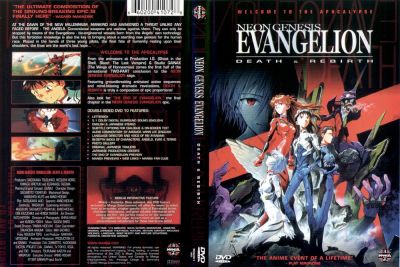Evangelion: Death and Rebirth: Difference between revisions
No edit summary |
m (→Death: Very minor grammatical fix.) |
||
| Line 11: | Line 11: | ||
''Main article: [[Evangelion: Death]]'' | ''Main article: [[Evangelion: Death]]'' | ||
Compilation of the series into a 1 hour movie. | Compilation of the series into a 1-hour movie. | ||
==Rebirth== | ==Rebirth== | ||
Revision as of 17:58, 13 September 2019
Evangelion: Death and Rebirth (新世紀エヴァンゲリオン劇場版 シト新生, Shin Seiki Evangelion Gekijouban: Shi to Shinsei) is the first Evangelion theatrical release. It is comprised of two parts, Death and Rebirth.

Death and Rebirth is widely considered an obsolete entity. With the Renewal release of the films, Rebirth is abandoned, and Death and The End of Evangelion are packaged together (see: Revival of Evangelion).
However, Death itself, as a compilation movie, takes many liberties with scene ordering, and very often abandons chronological/airing order of scenes, in order to juxtapose various scenes from different points in the series together, for the sake of thematic significance. In addition, there are several added scenes (such as the famous 'String Quartet' scenes, and others) that do not appear either in the original series OR in the Director's Cuts of Episodes 21-24.
For these reasons, it can be beneficial for those who have watched both the series, and The End of Evangelion, to watch Death as well, to gain a new perspective on the series.
Death
Main article: Evangelion: Death
Compilation of the series into a 1-hour movie.
Rebirth
Main article: Evangelion: Rebirth
The first 25 minutes of The End of Evangelion. Originally planned to be the whole film but was not completed on time.
Notes
- The film's Japanese title, シト新生 ("SHITO shinsei"), can be read two different ways due to the utilization of katakana for the first half. 新生, "shinsei", means "rebirth". SHITO could be 死と ("shi to"), "death and", as per the English title. However, SHITO is also 使徒 ("shito"), what the Angels are called in Japanese (literally "apostle").
